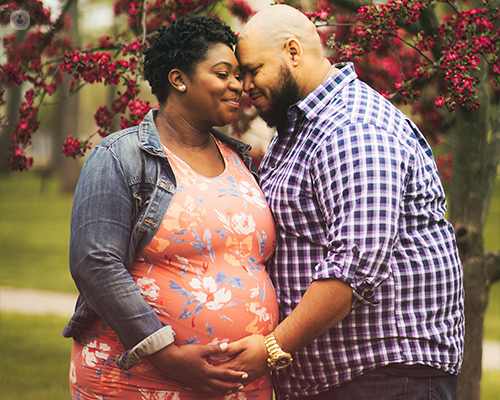Facing a high-risk pregnancy? Learn how maternal medicine provides expert support every step of the way
Written in association with:High-risk pregnancies are not uncommon – around 10 per cent of pregnancies are classified as ‘high risk’. While the term may seem scary, the wonders of modern obstetric medicine mean that mother and baby have better chances of making it through the issues safely. In this article, expert consultant obstetrician Ms Kenga Sivarajah highlights how maternal medicine can be utilised in every stage of a high-risk pregnancy.

A high-risk pregnancy is one where doctors have discovered a complication or risk to the health of the mother and/or the foetus. These can be discovered at any stage of the pregnancy. People with high-risk pregnancies may need special medical care before, during, and after they give birth. Factors that contribute to a high-risk pregnancy are:
- Preexisting health conditions
- Health conditions that develop during the pregnancy
- Lifestyle factors, such as substance use
- Complications that occurred during a prior pregnancy
What is maternal medicine?
Maternal medicine is specialised prenatal care for those with high-risk pregnancies, often made of multidisciplinary teams that may consist of specialists in foetal medicine and nurses, haematologists, physicians, midwives, and genetic counsellors. They will have expertise which allows them to perform prenatal diagnosis techniques like ultrasound, genetic testing, and management of medical complications. They work together to ensure and maintain the health, comfort, and safety of both mother and baby, from the first few weeks of pregnancy all the way to postpartum.
Depending on the specific condition of the mother or baby, those who receive maternal medical care will be scheduled for more frequent appointments for close monitoring and treatment for check-ups, early interventional treatment, screening and testing.
What does a high-risk pregnancy mean?
Some of the many conditions that are likely to cause a pregnancy to be high risk:
- High blood pressure
- Diabetes
- Epilepsy
- Thyroid disease
- Cardiovascular disorders
- Asthma without treatment
- Sickle cell disease
- HIV
- Autoimmune diseases like lupus
- Uterine and ovarian issues and obstruction like fibroids, PCOS, or endometriosis.
If you are pregnant and do not have, or do not know if you have, the conditions described above, signs that something is wrong during your pregnancy and you will need to seek medical attention include high fever, continuous vomiting, pain whilst urinating and blood in urine, frequent or bloody diarrhoea, swelling of the feet, hands, or face (which are signs of preeclampsia), intense headaches and distorted vision, abdominal pain particularly on one side of the belly and from the beginning of the pregnancy – this could be a sign of an ectopic pregnancy – and heavy vaginal bleeding, which may indicate a miscarriage.
A high-risk pregnancy that isn’t monitored and managed can have consequences for both the mother and the baby that are life-long debilitating or even deadly, such as:
- A pre-term delivery
- An emergency Caesarean delivery
- Preeclampsia disorders
- Low birth weight
- Congenital conditions like a cleft palate, atypical limbs, neural tube defects, or heart or brain dysfunction
How does maternal medicine help in cases of high-risk pregnancies?
It is important to receive thorough prenatal care early in the pregnancy. Complications can be avoided or managed thanks to diagnoses from urine and blood testing, and ultrasound scans which can be used to compile a biophysical profile that looks at the baby’s heart rate, muscle tone, body movement, breathing, and the amount of amniotic fluid around them.
Maternal medicine encompasses mental health services, blood testing, close monitoring from the obstetrician, consultations with specialists, and exploration of birth options if needed. The risk factors that can impact the pregnancy may be discovered and rectified or treated, such as making adjustments to the diet and physical activity, or the management of conditions with methods and medications that are suitable for the mother and baby.
If you have concerns regarding the status of your pregnancy, you can consult with Ms Sivarajah via her Top Doctors profile.


